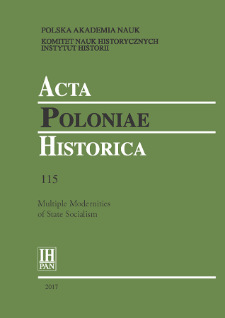
Object
Title: Biopolitics and (non-)modernity : population micro-policy, expert knowledge and family in late-communist Poland
Subtitle:
Acta Poloniae Historica T. 115 (2017)
Contributor:
Korecki, Tristan : Trans. ; Institute of History of the Polish Academy of Sciences ; Polish National Historical Committee
Publisher:
Place of publishing:
Description:
Type of object:
Abstract:
This article seeks to investigate the problem of modernity in post-war communist Poland (People’s Republic of Poland, Pol.: Polska Rzeczpospolita Ludowa, PRL) through the prism of concepts and ideas of model family and possibilities of shaping it, as promoted in the expert discourse and guidance practices. On the interpretation level, it is important to refer to modern – that is, rational and expert knowledge-propelled – social control methods, strictly connected with the concepts or ideas of modern society. The crucial aspect is the tension between biopolitics understood in terms of actions and strategies of modern dictatorship devised to control a population and the concepts of modernity that appeared in expert discourses in the context of, i.a., decreasing natality, modern birth control methods or practices related to maternity/paternity. Analysed are experts’ opinions proving dominant in the discourse, including the arguments put forth at sessions of the Family Council and the Planned Parenthood Association.
References:
Arnson Johann P.‚ ‘Communism and Modernity’, Daedalus, cxxix, 1 (2000), 61-90.
Bińczyk Ewa, ‘Nieklasyczna socjologia medycyny Michela Foucault: praktyki medykalizacji jako praktyki władzy’, in Włodzimierz Piątkowski and Anna Titkow (eds.), W stronę socjologii zdrowia (Lublin, 2002).
Bukraba-Rylska Izabella, ‘Na styku kultur: kategorie poznawcze i dylematy moralne’, Mazowieckie Studia Humanistyczne, iii, 1 (1997), 147-62.
Bukraba-Rylska Izabella, Służebna i służalcza rola socjologii oraz inne kwestie. Wybór artykułów z lat 2007–2009 (Warszawa, 2009), 7-41.
Ignaciuk Agata, ‘Clueless about contraception. The introduction and circulation of the contraceptive pill in state-socialist Poland (1960s–1970s)’, Medicina nei Secoli. Arte e Scienza / Journal of History of Medicine, xxvi, 2 (2014), 509-36.
Klich-Kluczewska Barbara, ‘Making up for the losses of war: Reproduction politics in Postwar Poland’, in Ruth Leiserowitz and Maren Röger (eds.), Women and Men at War: A Gender Perspective on World War II and its Aftermath in Central and Eastern Europe (Osnabrück, 2012), 307-28.
Klich-Kluczewska Barbara, Rodzina, tabu i komunizm w Polsce (Kraków, 2015).
Kocka Jürgen, ‘The GDR. A Special Kind of Modern Dictatorship’, in Konrad H. Jarausch (ed.), Dictatorship as Experience: Towards a Socio-cultural History of the GDR (New York and Oxford, 1999).
Kościańska Agnieszka, Płeć, przyjemność i przemoc. Kształtowanie wiedzy eksperckiej o seksualności w Polsce (Warszawa, 2014), 39-41.
Lemke Thomas, Biopolitics. An advanced introduction, trans. Eric F. Trump (New York and London, 2011).
Musiał Wojciech, Modernizacja Polski. Polityki rządowe w latach 1918-2004 (Toruń, 2013).
Szlendak Tomasz, ‘Interpretacje kryzysu rodziny w socjologii. Między familijnym fundamentalizmem a rewolucją stylów życia’, Studia Socjologiczne, 4 (2008), 5-41.
Relation:
Volume:
Start page:
End page:
Detailed Resource Type:
Format:
Resource Identifier:
oai:rcin.org.pl:63833 ; 0001-6829
Source:
IH PAN, sygn. A.295/115 Podr. ; IH PAN, sygn. A.296/115 ; click here to follow the link
Language:
Rights:
Creative Commons Attribution BY-ND 4.0 license
Terms of use:
Copyright-protected material. [CC BY-ND 4.0] May be used within the scope specified in Creative Commons Attribution BY-ND 4.0 license, full text available at: ; -
Digitizing institution:
Institute of History of the Polish Academy of Sciences
Original in:
Library of the Institute of History PAS
Access:
Object collections:
- Institute of History PAS > Serials
- Institute of History PAS > Institute Publications
- Institute of History PAS > Institute Publications > Journals
- Institute of History PAS > Institute Publications > Journals > Acta Poloniae Historica
Last modified:
Sep 22, 2023
In our library since:
Nov 29, 2017
Number of object content downloads / hits:
497
All available object's versions:
https://rcin.org.pl/ihpan/publication/83487
Show description in RDF format:
Show description in RDFa format:
Show description in OAI-PMH format:
Objects Similar
Adamus, Anna Maria (1982– )
Jarosz, Dariusz (1959– )
Szpak, Ewelina (1980– )
Szpak, Ewelina (1980– )
Cieśliński, Marek (1968– )
Zaćmiński, Andrzej
Machcewicz, Anna

 INSTYTUT ARCHEOLOGII I ETNOLOGII POLSKIEJ AKADEMII NAUK
INSTYTUT ARCHEOLOGII I ETNOLOGII POLSKIEJ AKADEMII NAUK
 INSTYTUT BADAŃ LITERACKICH POLSKIEJ AKADEMII NAUK
INSTYTUT BADAŃ LITERACKICH POLSKIEJ AKADEMII NAUK
 INSTYTUT BADAWCZY LEŚNICTWA
INSTYTUT BADAWCZY LEŚNICTWA
 INSTYTUT BIOLOGII DOŚWIADCZALNEJ IM. MARCELEGO NENCKIEGO POLSKIEJ AKADEMII NAUK
INSTYTUT BIOLOGII DOŚWIADCZALNEJ IM. MARCELEGO NENCKIEGO POLSKIEJ AKADEMII NAUK
 INSTYTUT BIOLOGII SSAKÓW POLSKIEJ AKADEMII NAUK
INSTYTUT BIOLOGII SSAKÓW POLSKIEJ AKADEMII NAUK
 INSTYTUT CHEMII FIZYCZNEJ PAN
INSTYTUT CHEMII FIZYCZNEJ PAN
 INSTYTUT CHEMII ORGANICZNEJ PAN
INSTYTUT CHEMII ORGANICZNEJ PAN
 INSTYTUT FILOZOFII I SOCJOLOGII PAN
INSTYTUT FILOZOFII I SOCJOLOGII PAN
 INSTYTUT GEOGRAFII I PRZESTRZENNEGO ZAGOSPODAROWANIA PAN
INSTYTUT GEOGRAFII I PRZESTRZENNEGO ZAGOSPODAROWANIA PAN
 INSTYTUT HISTORII im. TADEUSZA MANTEUFFLA POLSKIEJ AKADEMII NAUK
INSTYTUT HISTORII im. TADEUSZA MANTEUFFLA POLSKIEJ AKADEMII NAUK
 INSTYTUT JĘZYKA POLSKIEGO POLSKIEJ AKADEMII NAUK
INSTYTUT JĘZYKA POLSKIEGO POLSKIEJ AKADEMII NAUK
 INSTYTUT MATEMATYCZNY PAN
INSTYTUT MATEMATYCZNY PAN
 INSTYTUT MEDYCYNY DOŚWIADCZALNEJ I KLINICZNEJ IM.MIROSŁAWA MOSSAKOWSKIEGO POLSKIEJ AKADEMII NAUK
INSTYTUT MEDYCYNY DOŚWIADCZALNEJ I KLINICZNEJ IM.MIROSŁAWA MOSSAKOWSKIEGO POLSKIEJ AKADEMII NAUK
 INSTYTUT PODSTAWOWYCH PROBLEMÓW TECHNIKI PAN
INSTYTUT PODSTAWOWYCH PROBLEMÓW TECHNIKI PAN
 INSTYTUT SLAWISTYKI PAN
INSTYTUT SLAWISTYKI PAN
 SIEĆ BADAWCZA ŁUKASIEWICZ - INSTYTUT TECHNOLOGII MATERIAŁÓW ELEKTRONICZNYCH
SIEĆ BADAWCZA ŁUKASIEWICZ - INSTYTUT TECHNOLOGII MATERIAŁÓW ELEKTRONICZNYCH
 MUZEUM I INSTYTUT ZOOLOGII POLSKIEJ AKADEMII NAUK
MUZEUM I INSTYTUT ZOOLOGII POLSKIEJ AKADEMII NAUK
 INSTYTUT BADAŃ SYSTEMOWYCH PAN
INSTYTUT BADAŃ SYSTEMOWYCH PAN
 INSTYTUT BOTANIKI IM. WŁADYSŁAWA SZAFERA POLSKIEJ AKADEMII NAUK
INSTYTUT BOTANIKI IM. WŁADYSŁAWA SZAFERA POLSKIEJ AKADEMII NAUK




































